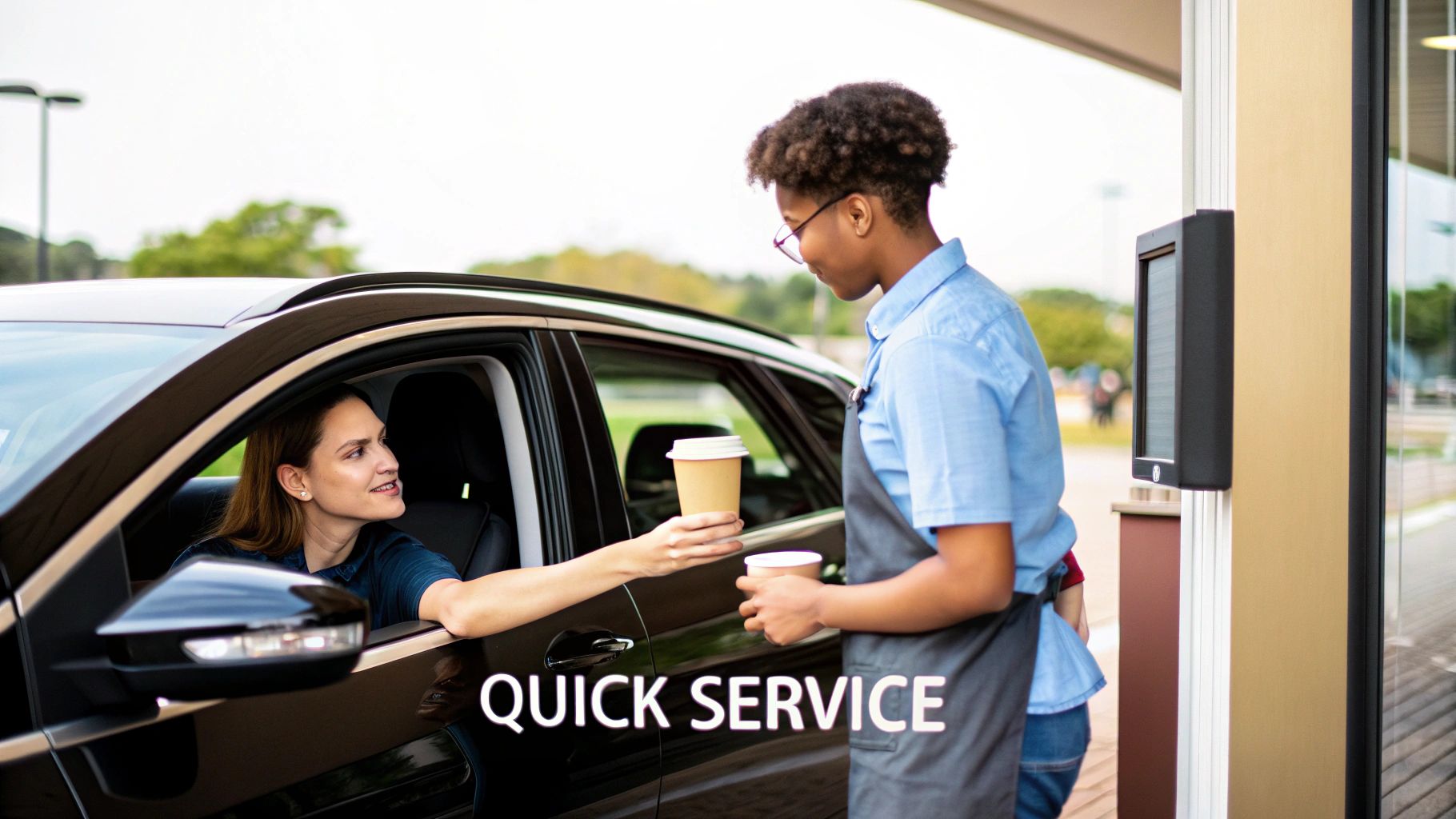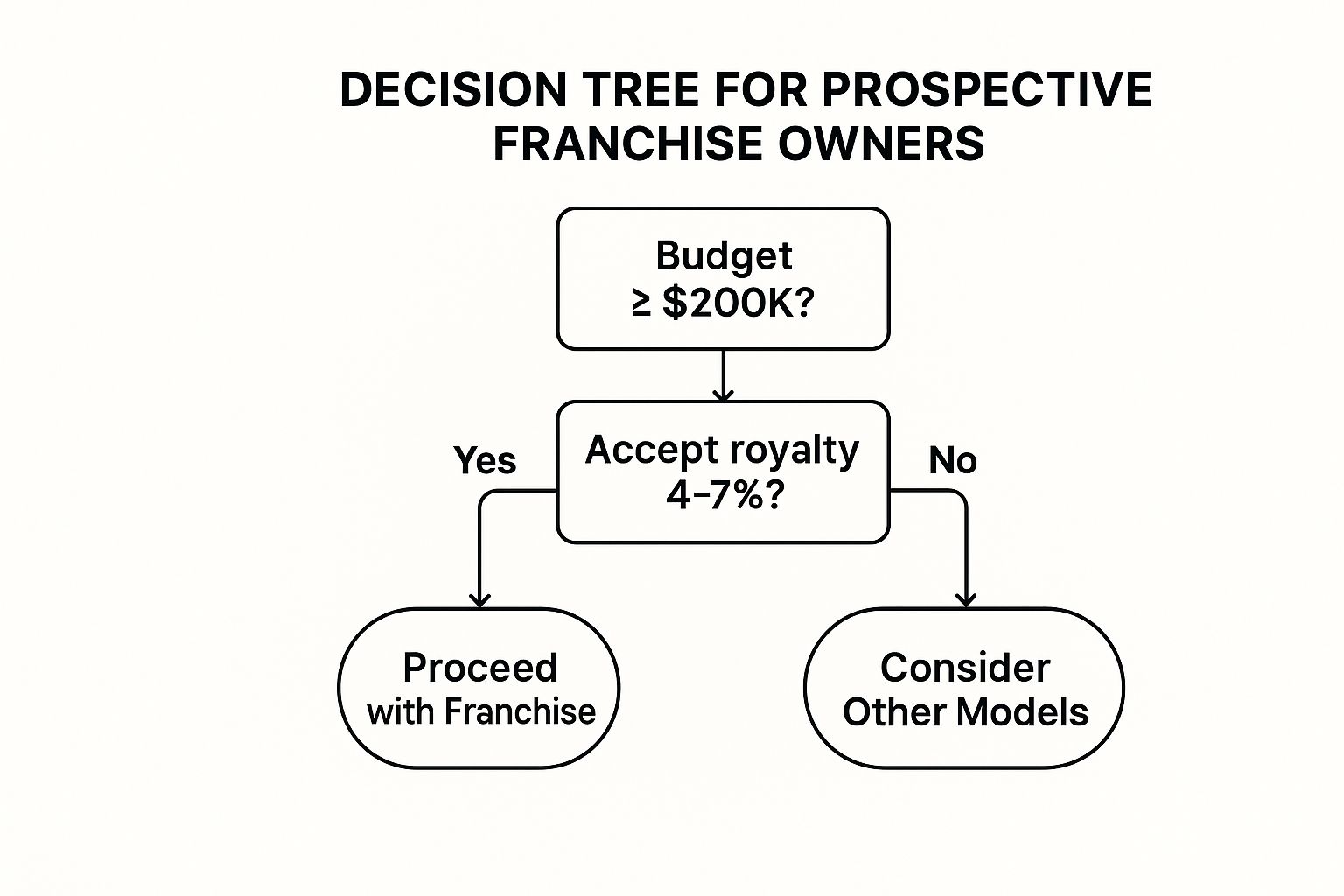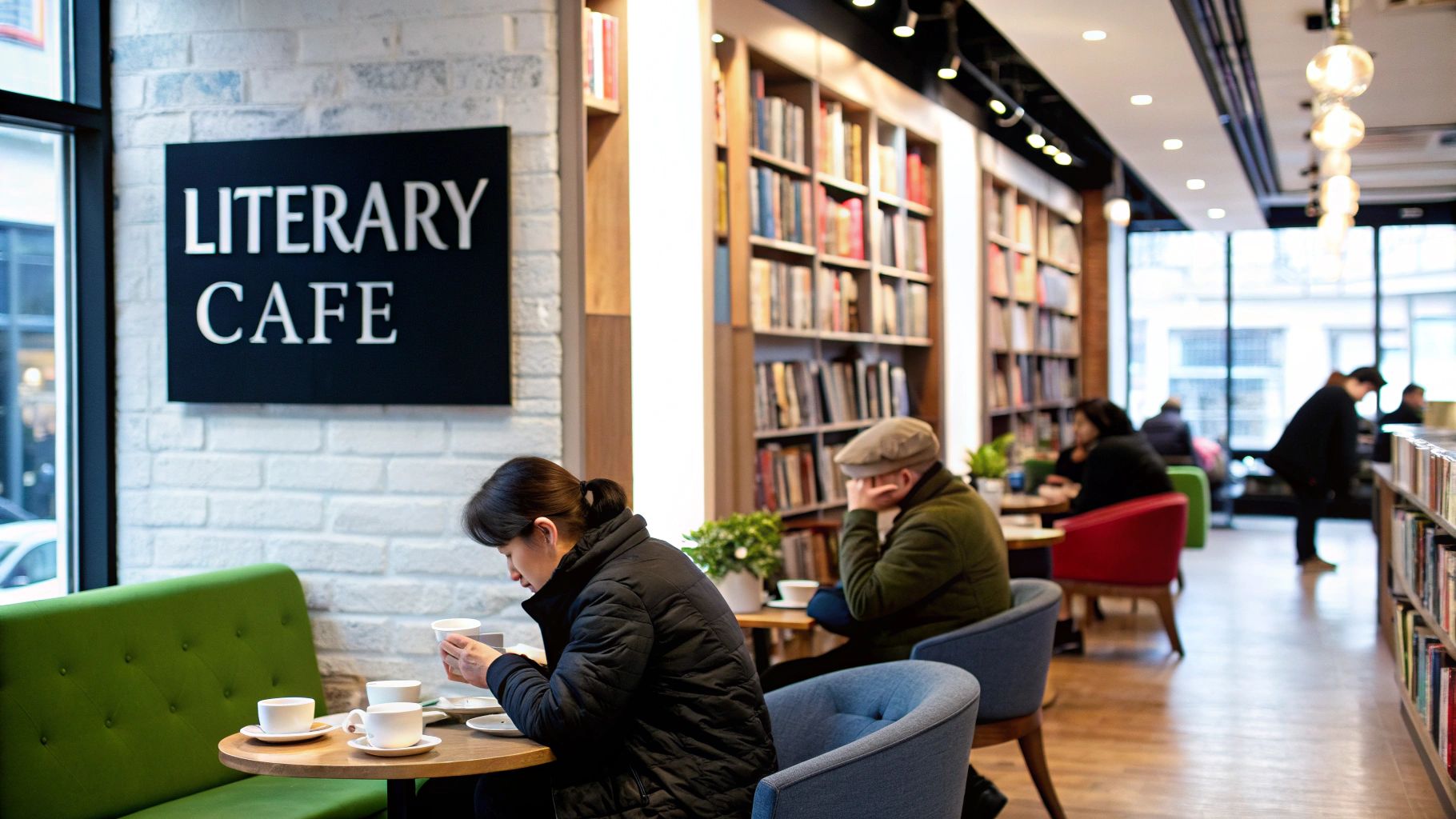
6 UK Coffee Shop Business Plan Example Breakdowns (2025)
Share
Launching a speciality coffee shop in the UK's vibrant market is more than just a dream; it's a detailed strategic mission. While many aspiring entrepreneurs search for a definitive 'coffee shop business plan example', the secret ingredient to success is a blueprint meticulously tailored to a unique vision. A generic template simply won't capture the essence of a local independent or the logistical needs of a high-speed drive-thru.
This guide moves beyond one-size-fits-all solutions. We will deconstruct six distinct coffee shop models, each perfectly suited for the dynamic UK market. You won’t just see examples; you'll get a strategic breakdown of their financial projections, target audience analysis, and unique operational challenges.
We'll dive into the specific, actionable insights you need to build a compelling plan. From a community-focused independent in Manchester to a nimble mobile cart navigating a London festival, you will gain the clarity to write a business plan that truly works. This is your roadmap to securing funding, defining your brand, and brewing a successful business with a uniquely British flavour. Let's get started.
1. The Independent Speciality Coffee House: The Community Hub Model
This coffee shop business plan example centres on creating more than just a place to grab a coffee; it’s about building a destination. The "Community Hub" model thrives on becoming an essential part of the local neighbourhood, a welcoming "third place" between home and work where people connect, relax, and recharge. This approach moves beyond the transactional nature of high-street chains, focusing instead on deep-rooted customer loyalty built on exceptional quality and a genuine sense of belonging.
The entire business is built on a foundation of excellence. This means sourcing exceptional single-origin beans from a respected UK-based roaster, such as the renowned Ue Coffee Roasters, and investing heavily in barista training. The goal is to ensure every cup served is a testament to quality, turning first-time visitors into regulars who appreciate the craft.
Strategic Breakdown
The financial strategy for this model hinges on higher-margin speciality drinks and a curated menu of locally sourced, artisanal products. Think handmade pastries from a nearby bakery or savoury snacks from a local supplier. This not only supports other small businesses but also creates a unique offering that cannot be replicated by larger competitors.
Key Strategic Insight: The core of the Community Hub model is its emphasis on atmosphere and customer interaction. The physical space must be meticulously designed to be comfortable and inviting, encouraging customers to linger. This focus on the overall visit is crucial; many businesses are exploring new ways of enhancing guest experiences in a hospitality setting to build stronger customer relationships.
Actionable Takeaways for Your Plan
If this model inspires you, here are some actionable steps to include in your own coffee shop business plan:
- Define Your Niche: Identify a specific neighbourhood or community in the UK that is underserved by high-quality, independent coffee shops. Your plan should detail the local demographic and their potential interest in a speciality offering.
- Forge Local Partnerships: Actively seek collaborations with local bakeries, artists, and community groups. Your business plan should outline potential partners and how these relationships will be mutually beneficial, such as hosting local art or running community workshops.
- Invest in Your Team: Your baristas are your brand ambassadors. Budget for comprehensive training in coffee knowledge, brewing techniques, and, most importantly, customer service. A friendly, knowledgeable team is non-negotiable.
- Create a Membership or Loyalty Programme: Design a programme that rewards regulars and makes them feel like insiders. This could include exclusive access to new beans, cupping sessions, or discounts on workshops. This builds a loyal tribe around your brand.
2. The Drive-Thru Coffee Kiosk: The Speed and Convenience Model
This coffee shop business plan example is engineered for maximum efficiency, catering to customers on the move. The Drive-Thru Coffee Kiosk model strips away the traditional café seating area, focusing entirely on speed, consistency, and convenience. By operating from a small-footprint kiosk, this model significantly reduces overheads like rent and staffing while targeting high-volume sales from commuter traffic and busy shoppers.

The success of this approach is built on a streamlined operational workflow designed to serve customers in minutes, if not seconds. While speed is paramount, quality cannot be compromised. The menu is intentionally limited to core, high-demand drinks that can be prepared quickly and consistently, ensuring every customer receives the same great product on every visit. This model thrives in locations like petrol station forecourts, retail park car parks, and busy A-roads.
Strategic Breakdown
The financial engine of a drive-thru kiosk is volume. The strategy is to serve a high number of customers with a lower average spend compared to a sit-in café. Profitability is achieved through low operational costs and efficient inventory management. Technology plays a critical role, with mobile pre-ordering and payment systems being essential tools to minimise queues and maximise throughput, particularly during peak morning hours.
Key Strategic Insight: The core of the Drive-Thru Kiosk model is its laser focus on operational excellence. Every second counts, and the entire customer journey, from ordering to collection, must be frictionless. The workflow, equipment layout, and staff training are all optimised for speed without sacrificing the friendly, personal interaction that encourages repeat business.
Actionable Takeaways for Your Plan
If this high-speed model aligns with your vision, here are some actionable steps to include in your own coffee shop business plan:
- Prioritise Location Scouting: Your business plan must include a detailed analysis of potential sites. Focus on areas with high volumes of morning commuter traffic. Data on traffic flow, local demographics, and proximity to competitors is essential.
- Design an Efficient Workflow: Map out the physical layout of your kiosk to minimise staff movement and optimise the order-to-delivery process. Your plan should detail the specific equipment and technology, such as dual-sided service windows or advanced point-of-sale systems, needed to achieve your service speed goals.
- Develop a Streamlined Menu: Create a concise menu of popular, high-margin drinks that are quick to prepare. Your business plan should justify each menu item based on its profitability and speed of production, avoiding complex or time-consuming options.
- Implement a Strong Loyalty Programme: With a transactional model, encouraging repeat visits is crucial. Outline a simple, effective digital loyalty programme that rewards frequency. Ideas include a free drink after a certain number of purchases or exclusive offers for regular customers, all managed through a mobile app.
3. The Coffee Shop Franchise: The Plug-and-Play Model
Opting for a franchise is a business plan example rooted in proven success. This model involves partnering with an established coffee brand to open a new location under their banner. It’s a "plug-and-play" approach that provides you with a complete business system from day one, including brand recognition, operational procedures, marketing support, and supply chain logistics, in exchange for initial franchise fees and ongoing royalties.
This path is ideal for entrepreneurs in the UK who want to enter the coffee industry with a lower risk profile and a clear roadmap. Instead of building a brand from scratch, you are buying into a system that has already been tested and refined. The franchisor provides the blueprint, from shop design and equipment lists to staff training protocols, allowing you to focus on execution and local management.
Strategic Breakdown
The financial strategy for a franchise is built on volume and operational efficiency. You benefit from the parent company's national marketing campaigns and established brand loyalty, which drives immediate footfall. The core of your business plan will focus on adhering to the franchisor's model, managing costs effectively, and maximising sales within a protected territory.
Key Strategic Insight: The franchise model trades creative autonomy for a lower-risk, proven system. Success depends less on entrepreneurial innovation and more on your ability to execute a pre-defined plan meticulously. Your business plan must demonstrate a clear understanding of the Franchise Agreement and a solid financial footing to cover both the initial investment and ongoing operational costs.
The following decision tree helps visualise the initial high-level financial considerations when exploring the franchise route.

This visualisation highlights that the franchise model has significant upfront financial prerequisites that must be met before other factors are even considered.
Actionable Takeaways for Your Plan
If the franchise model aligns with your goals, incorporate these specific steps into your coffee shop business plan:
- Conduct In-Depth Due Diligence: Your business plan must include a section detailing your research into potential UK-based franchisors. Analyse their franchise prospectus, financial performance, and support structures.
- Speak to Existing Franchisees: Plan to interview at least three to five current franchisees of your target brand. Document their experiences with profitability, corporate support, and operational challenges in your plan to show a realistic understanding of the investment.
- Secure Robust Funding: A franchise requires substantial capital. Your financial projections should clearly outline the source of funds for the initial franchise fee, fit-out costs, and at least six months of working capital. This demonstrates financial readiness to the franchisor and potential lenders.
- Analyse Territory and Market Saturation: Include a detailed analysis of your proposed territory. Your plan should evaluate local competition (including from the same franchise), demographic fit, and the exclusivity rights granted by the franchisor to ensure your location has a strong chance of success.
4. The Coffee Shop + Bookstore Hybrid: The Literary Retreat Model
This coffee shop business plan example fuses the comforting aroma of freshly brewed coffee with the quiet allure of a bookstore. The Literary Retreat model is designed to create an immersive environment that encourages customers to slow down, browse, and settle in. It’s a concept that taps into the desire for intellectual and sensory comfort, offering a haven from the fast pace of modern life where patrons can enjoy both a great flat white and a compelling read.
The success of this dual-concept business lies in its symbiotic nature. Coffee sales drive footfall and encourage prolonged stays, which in turn leads to book sales. Conversely, the appeal of a curated book collection draws in a literary-minded clientele who are likely to become regular coffee drinkers. This model is about crafting a destination experience, tapping into a well-established tradition of literary cafés across the UK.

Strategic Breakdown
The financial strategy for this hybrid model centres on creating two intertwined revenue streams. While speciality coffee and high-quality pastries provide consistent, high-margin daily income, book sales offer a higher-ticket, albeit less frequent, source of revenue. The key is to maximise the crossover potential, using the café to market the books and vice-versa. Hosting events like author signings, book clubs, or poetry readings can transform the space into a cultural hub, driving sales for both sides of the business.
Key Strategic Insight: The core of the Literary Retreat model is the careful curation of both the coffee and book offerings to appeal to a specific demographic. The environment must be meticulously planned to accommodate both quiet reading and social interaction, with distinct zones, comfortable seating, and excellent lighting.
Actionable Takeaways for Your Plan
If this hybrid model captures your imagination, consider these actionable steps for your own coffee shop business plan:
- Curate a Cohesive Theme: Your business plan should define the identity of your shop. Will you focus on contemporary fiction, independent zines, or classic literature? Your coffee offering and café décor should align with this theme to create a strong, memorable brand.
- Plan Your Layout Meticulously: A detailed floor plan is essential. Your plan must show how you will create distinct yet connected areas for coffee service, comfortable seating, and book browsing. Consider traffic flow to ensure bar queues don't disrupt readers.
- Develop an Events Strategy: Outline a calendar of potential events in your business plan. Include author Q&As, book club launch nights, or even "silent reading" parties. This strategy builds community and provides a compelling reason for customers to visit regularly.
- Create Crossover Promotions: Design offers that link both sides of the business. Your plan could detail "book and a brew" deals, a free coffee with the purchase of a featured author's book, or a loyalty scheme that earns points from both book and café purchases.
5. The Mobile Coffee Cart/Truck: The Entrepreneur on Wheels Model
This coffee shop business plan example strips the business down to its essentials: great coffee and direct customer access, without the constraints of a physical location. The "Entrepreneur on Wheels" model is built on flexibility and low overheads, using a mobile unit to serve high-quality coffee at diverse locations like farmers' markets, office parks, festivals, and private events. This approach is perfect for entrepreneurs who want to test their concept, build a brand, and generate revenue before committing to a costly long-term lease.
The business centres on agility and opportunity. The model's success relies on identifying high-footfall locations and securing the necessary permits and street trading licenses to operate. It demands a lean operational mindset, where every piece of equipment is chosen for its efficiency, compactness, and reliability. This isn't just about selling coffee; it's about taking the speciality coffee experience directly to the customer, wherever they might be in the UK.
Strategic Breakdown
The financial strategy for a mobile cart is driven by low start-up costs and operational expenses compared to a traditional brick-and-mortar café. Profitability hinges on volume, speed of service, and smart location scouting. The menu is typically streamlined, focusing on high-margin core coffee drinks and a small selection of pre-packaged, locally sourced snacks that are easy to handle and serve quickly, maximising turnover during peak periods.
Key Strategic Insight: The core advantage of the mobile model is its adaptability. Your business isn't tied to one neighbourhood's fortunes; you can move to where the customers are. This requires proactive relationship-building with event organisers, corporate facility managers, and local councils to secure profitable pitches. Success is less about waiting for customers to find you and more about strategically placing your business in their path.
Actionable Takeaways for Your Plan
If this agile model appeals to you, here are some actionable steps to include in your own coffee shop business plan:
- Map Out Your Operations: Your plan must detail your target locations and a schedule. Research and list potential farmers' markets, business parks, and annual events, including the costs and application processes for each.
- Navigate the Bureaucracy: Dedicate a significant section of your plan to licensing and permits. Detail the specific requirements from local councils for street trading, food hygiene ratings (such as the FSA's FHRS), public liability insurance, and vehicle certifications needed to operate legally in your target areas.
- Invest in Compact, Professional Gear: Your business plan's budget should prioritise high-quality, space-efficient equipment. A reliable dual-fuel espresso machine, a quiet generator, and an efficient grinder are non-negotiable investments that directly impact your service quality and speed.
- Design a "Rolling Billboard": Your vehicle is your primary marketing tool. Budget for professional, eye-catching branding and vehicle wrapping. Your plan should articulate how the design will capture your brand's essence and attract customers from a distance.
6. Co-working Space Coffee Shop: The Hybrid Productivity Model
This coffee shop business plan example merges two powerful modern trends: the demand for high-quality speciality coffee and the explosion of remote work. The hybrid model is built around providing a professional, productive environment for freelancers, remote workers, and small teams, underpinned by a premium café experience. It goes beyond simply offering free WiFi; it provides a fully-fledged workspace with amenities like bookable desks, meeting rooms, and high-speed internet, all funded by a combination of coffee sales and membership fees.
The concept capitalises on the desire for a "third place" that is more structured than a traditional café but more flexible and social than a corporate office. The coffee service isn't just an add-on; it's a core part of the value proposition. Offering expertly crafted espresso drinks and filter coffee justifies the premium environment and serves as a major draw, turning the space into a hub for productivity and professional connection.
Strategic Breakdown
The financial architecture for this model is diversified, relying on multiple revenue streams. These include daily or hourly "hot-desk" passes, monthly memberships for dedicated space, meeting room hire, and, of course, high-margin coffee and food sales. The key is to balance the two sides of the business, ensuring the café atmosphere enhances the workspace without disrupting it.
Key Strategic Insight: Success in the hybrid model depends on creating a seamless experience where hospitality and productivity coexist. The layout must be intelligently zoned, with quieter areas for deep work and more social zones around the coffee bar. Technology is paramount; enterprise-grade WiFi and an easy-to-use booking system for desks and rooms are non-negotiable investments that define the customer experience.
Actionable Takeaways for Your Plan
If this hybrid model aligns with your vision, integrate these steps into your coffee shop business plan:
- Develop Tiered Membership Packages: Outline clear membership options in your plan. This should range from a simple day pass for casual users to monthly subscriptions offering perks like printing credits, dedicated lockers, and discounts on coffee and meeting rooms.
- Invest in a Robust Tech Infrastructure: Your business plan must budget for superior technology. This includes ultra-reliable, high-speed internet, a secure network, accessible power outlets at every seat, and a user-friendly online platform for booking spaces.
- Design for Flexibility and Function: Plan a versatile space that can accommodate different work styles. Include collaborative tables, private booths for calls, and quiet zones. Your layout should be adaptable, allowing you to host networking events or workshops after hours.
- Curate a Professional Community: Your plan should detail a strategy for building a community. This could involve organising member-only networking mornings, skill-sharing workshops, or guest speaker events. A strong community transforms the space from a simple utility into an indispensable professional network.
Coffee Shop Business Model Comparison
| Business Model | Implementation Complexity | Resource Requirements | Expected Outcomes | Ideal Use Cases | Key Advantages |
|---|---|---|---|---|---|
| Independent Specialty Coffee Shop | High: requires skilled baristas, training, unique branding | High: premium equipment, quality beans, strong marketing | High profit margins, strong customer loyalty | Artisanal coffee lovers, local communities | Creative freedom, premium pricing, community focus |
| Drive-Thru Coffee Kiosk | Moderate: streamlined workflow, location selection | Moderate: small physical footprint, mobile ordering | Quick service, high volume, lower overhead | Busy commuters, convenience seekers | Low rent, reduced staff, fast ROI |
| Coffee Shop Franchise | Moderate to High: must follow strict corporate systems | High: franchise fees, standardized equipment | Lower risk, brand recognition, ongoing support | Entrepreneurs wanting proven models | Established brand, training, marketing support |
| Coffee Shop + Bookstore Hybrid | High: dual inventory and space management | High: café & retail inventory, space | Multiple revenue streams, longer customer stays | Book lovers, intellectual communities | Unique positioning, strong community engagement |
| Mobile Coffee Cart/Truck | Moderate: permit logistics, mobility challenges | Low to Moderate: compact equipment, vehicle maintenance | Flexible location, low overhead, market testing | Events, offices, festivals | Low startup costs, mobility, market adaptability |
| Co-working Space Coffee Shop | High: combines office amenities with café operations | High: office infrastructure, technology | Recurring revenue, premium pricing, community building | Remote workers, freelancers, entrepreneurs | Multiple revenue streams, predictable income |
From Plan to Pour: Crafting Your Winning Strategy
We've journeyed through six distinct models, from the community-centric Independent Specialty Coffee Shop to the agile Mobile Coffee Cart, and the high-efficiency Drive-Thru Kiosk. Each coffee shop business plan example we've dissected offers a unique blueprint for success within the dynamic UK speciality coffee scene. The key takeaway is clear: a successful business plan is not a rigid template but a living document, a strategic narrative that is uniquely yours.
Your plan is your compass. It's the story you tell investors, the roadmap you give your team, and the promise you make to your future customers. It must be more than just a collection of numbers; it must capture the very essence of your brand’s vision and flavour.
Key Insights to Brew Your Success
As you move from inspiration to execution, remember the core strategic threads woven through our examples:
- Niche is Everything: Whether it's the literary calm of a bookstore hybrid or the hyper-local focus of a neighbourhood independent, a well-defined niche allows you to own a specific corner of the market. Avoid trying to be everything to everyone.
- Operational Excellence Defines You: The streamlined workflow of a drive-thru and the inventory management of a mobile cart are not just operational details. They are crucial components of your brand promise, directly impacting customer experience and profitability.
- Financials Tell the Real Story: A passionate vision needs to be grounded in solid financial projections. Your plan must meticulously detail start-up costs, operational expenses, and realistic revenue forecasts. Before you seek funding, it's vital that you can confidently calculate your return on investment (ROI) to demonstrate viability and attract serious partners.
- Community is Your Currency: From the co-working space that fosters collaboration to the local shop that knows regulars by name, building a community creates loyalty that marketing budgets alone cannot buy.
Your Actionable Next Steps
The journey from a dream to a bustling café begins with the first line of your plan. Use the insights from the examples we've explored as your framework. Start by asking the big questions: Who is my ideal customer? What unique experience will I offer? How will my operations create consistent quality and service?
Let your answers guide the structure of your document. Blend the ambition of your vision with the pragmatism of a detailed financial forecast. Let it be a tool that not only secures funding but also serves as your guide through the challenges and triumphs ahead. The perfect coffee shop business plan example is the one you haven't written yet, the one that tells your unique story. Now is the time to pick up your pen and start pouring your vision onto the page.
Ready to source the exceptional beans that will define your menu? Partner with Ue Coffee Roasters to build a supply chain founded on quality, sustainability, and unparalleled flavour. Explore our wholesale programmes and discover how our award-winning coffees can become the heart of your business plan. Ue Coffee Roasters
